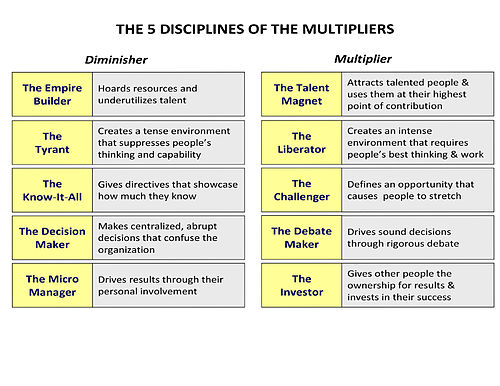- Multipliers
-
Multipliers Author(s) Liz Wiseman & Greg Mckeown Country  United States
United StatesLanguage English Subject(s) Leadership, Collective Intelligence Publisher Harper Collins Publication date June 15, 2010 Media type Hardcover Multipliers: How the Best Leaders Make Everyone Smarter
Multipliers: How the Best Leaders Make Everyone Smarter (Harper Business June, 2010) is an examination of why some leaders (called “Diminishers”) drain capability and intelligence from their teams while others (called “Multipliers”) amplify it to produce better results.
The publisher description reads as follows:
“We’ve all had experience with two dramatically different types of leaders. The first type drains intelligence, energy, and capability from the people around them and always needs to be the smartest person in the room. These are the idea killers, the energy sappers, the diminishers of talent and commitment. On the other side of the spectrum are leaders who use their intelligence to amplify the smarts and capabilities of the people around them. When these leaders walk into a room, light bulbs go off over people’s heads; ideas flow and problems get solved. These are the leaders who inspire employees to stretch themselves to deliver results that surpass expectations. These are the Multipliers. And the world needs more of them, especially now when leaders are expected to do more with less.
“In this engaging and highly practical book, leadership expert Liz Wiseman and management consultant Greg McKeown explore these two leadership styles, persuasively showing how Multipliers can have a resoundingly positive and profitable effect on organizations—getting more done with fewer resources, developing and attracting talent, and cultivating new ideas and energy to drive organizational change and innovation.
“In analyzing data from more than 150 leaders, Wiseman and McKeown have identified five disciplines that distinguish Multipliers from Diminishers. These five disciplines are not based on innate talent; indeed they are skills and practices that everyone can learn to use—even lifelong and recalcitrant Diminishers. Lively, real-world case studies and practical tips and techniques bring to life each of these principles, showing you how to become a Multiplier too, whether you are a new or an experienced manager. Just imagine what you could accomplish if you could harness all the energy and intelligence around you. Multipliers will show you how.”
The Model
MULTIPLIERS : These leaders are genius makers and bring out the intelligence in others. They build collective, viral intelligence in organizations.
DIMINISHERS : These leaders are absorbed in their own intelligence, stifle others, and deplete the organization of crucial intelligence and capability.The Five Disciplines of the Multiplier:
1. The Talent Magnet: Attracts and deploys talent at its highest point of contribution.
2. The Liberator: Creates a climate of safety and ambition that both invites and demands people’s best thinking and work.
3. The Challenger: Define an opportunity that causes people to stretch.
4. The Debate Maker: Drives sound decisions through rigorous debate.
5. The Investor: Delivers extraordinary results again and again without direct management.The Results
By Extracting people's full capability, Multipliers get twice the capability from people as do Diminishers.
References
Categories:- 2010 books
- Business books
Wikimedia Foundation. 2010.



